Twin Peaks Episode 9, alternatively called “Coma” is the second episode of Twin Peaks’ second season. It was written by Harley Peyton and directed by David Lynch. The episode aired on Oct. 6, 1990, and saw a drop in ratings compared to the Season 2 premiere. Originally, there weren’t any titles for the episodes, so most old-school fans like myself simply knew this to be Episode 9—a pivotal one where things in Twin Peaks begin to get a bit weirder, and certainly a lot darker.
“A Mind That Wanders”

At the Great Northern, Dale and Albert have breakfast while discussing Laura’s murder. The key elements of their conversation are a brief account of Tibetan history, Dale’s decision to show Ronette a sketch of BOB, Jacques’s autopsy, and Dale’s missing ring. They also discuss Dale’s hope that Shelly is ready to talk about the Mill fire, and Albert reveals that Windom Earle is on the loose.
Albert’s sarcasm is quite enjoyable in this scene. I also like how Albert is concerned about Dale’s health after being shot, and how Dale expresses his pleasure that Albert is on the case with him. I find their mutual respect for one another charming, despite the differences in their approach. Albert’s snappy dialogue is a true credit to Harley Peyton’s writing, as well.
I did find it hard to believe that despite both their brilliant minds, somehow Dale and Albert missed that Mr. Lee/Cousin Jonathan was watching them from a nearby table. Also, the curious appearance of a barbershop quartet in the background is fun in a quirky way and keeps the overall tone of the conversation on the light side, but it feels a little unnecessary.
“Do you see creamed corn on that plate?”
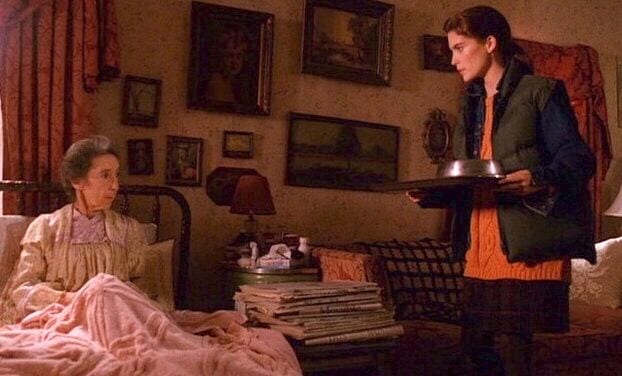
Donna has a strange encounter while delivering Meals on Wheels to the Tremond house. Austin Lynch (David Lynch’s real-life son) plays Mrs. Tremond’s grandson, who is studying magic. It should be noted that his role was later played by Jonny Leppell in Fire Walk With Me. There was also some fan speculation that the character might have evolved into Balthazar Getty’s role in Season 3 as Red, aka Shelly’s new man.
This scene feels very Lynchian and mysterious, and I love this particular arc in Donna’s character. Lara Flynn Boyle’s version of Donna has always been my favorite. Lara plays Donna a bit darker and more soulful, and I always liked her scenes with Harold Smith, despite the awkwardness of his behavior. The larger mystery of who Mrs. Tremond and her grandson truly are looms in this scene. It was my impression over the years that perhaps they wanted to draw Harold Smith out because he had Laura’s secret diary. When Mrs. Tremond tells Donna, “Mr. Smith does not leave his house,” she almost seems frustrated, and it prompts Donna to slip her phone number under Harold’s door.
“Are you in the train car?”
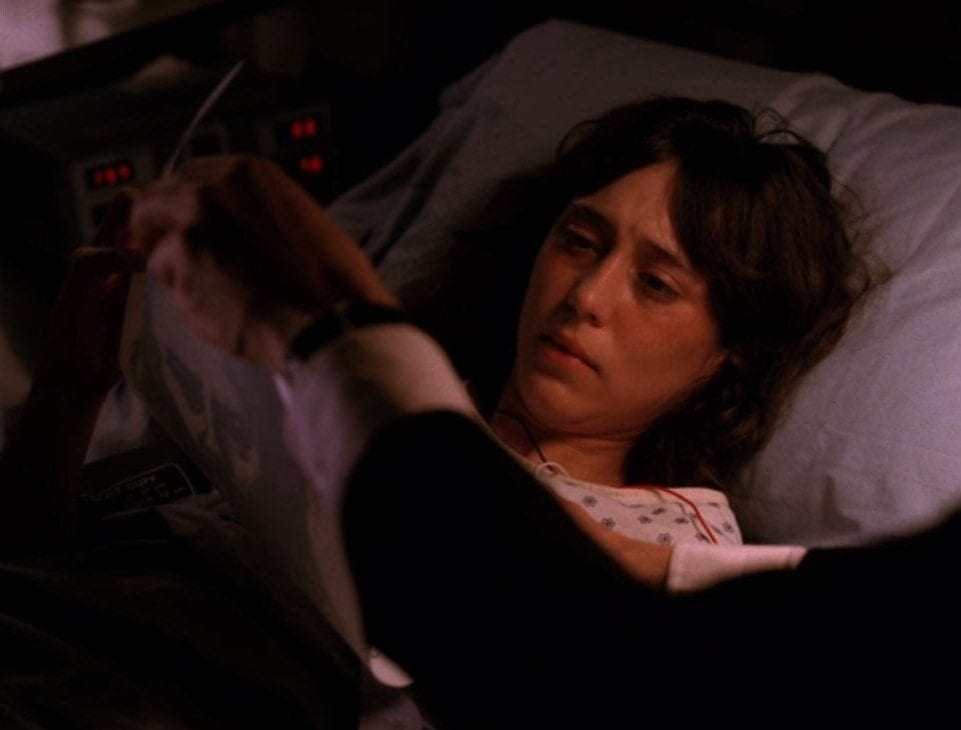
Dale and Harry have a humorous struggle with a pair of stools in Ronette’s hospital room. Dale shows her a sketch of BOB, which causes a dramatic response from Ronette, thus confirming BOB was in the train car with her and Laura.
The blend of humor and horror in this scene has a heavy impact. The mystery of Laura’s murder really ups the ante with Ronette’s intense reaction to seeing BOB’s face. Her terror is real and raw, and it’s keenly felt every time I watch this episode. The way Lynch focuses on BOB’s sketch, so the viewer can experience the fright right along with Ronette, always gives me a shiver. I also like how it clearly unnerves both Dale and Harry.
“Ben, where are those hickory sticks?”

In Ben’s office, Ben and Jerry debate which Mill ledger they should burn, while Jerry holds a treasured smoked-cheese pig. After determining that both ledgers have merit, they ultimately decide to burn some marshmallows instead.
In my opinion, at the core of Ben and Jerry’s brotherly love seems to be a shared penchant for mischief. They also delight in each other’s quirks. This scene, although brief, embodies that notion, as Ben has no reaction to Jerry’s strange and possibly coked-out behavior. Instead, Ben’s ready with a bag of marshmallows that he just happens to keep handy in his desk. It’s also impossible not to notice Ben’s spotted socks, no doubt a nod to his own uniqueness. The dialogue does feel like a formulaic device that serves simply as a plot review, but the fun nature of Ben and Jerry’s relationship makes it work in an endearing way.
“Deliver the Message”

Andy fumbles with tape as he tries to post a “Wanted” flyer of BOB at the Double R. Major Briggs watches him curiously before he’s approached by the Log Lady, who says her log has something to tell him. She translates on behalf of her log and tells the Major to “deliver the message.”
There are so many elements of this scene that I adore. Despite being a short scene, the character development is incredibly strong. That’s a credit to Lynch’s directing style, and is a huge reason why Twin Peaks’ characters are so lovable. Andy’s struggle with Scotch tape is true to his dimwitted nature, and the way Major Briggs watches him, almost as if he can’t believe what he’s seeing, amplifies the humor.
In addition, I love how Norma puts Margaret in her place when she warns her not to throw her “sticky pitch gum” out in the diner. Margaret’s expression is priceless and reveals a bit of embarrassment at being so politely scolded. I imagine that in every small town, in every restaurant or bar, there are regulars like Margaret who confound the establishment. Nevertheless, Margaret’s focus on Major Briggs is what’s truly important.
When she asks if he’s proud because of the “shiny objects” on his jacket, Major Briggs answers with one of the best and most insightful pieces of dialogue his character ever spoke: “Achievement is its own reward, pride obscures it.” The major is not a proud or vain man, but a man of honor. The mysterious nature of his character, and of Margaret’s, are heavy elements in Twin Peaks’ mythology. Having these two come together to reveal a message from the log, a mysterious character in its own right, really deepens the conundrum. For those who’ve read Mark Frost’s book, The Secret History of Twin Peaks, and are familiar with Season 3 of Twin Peaks, this scene plays well with the idea that Major Briggs already has a strong understanding of Twin Peaks’ supernatural secrets.
“I thought it meant I didn’t have to take a bath!”
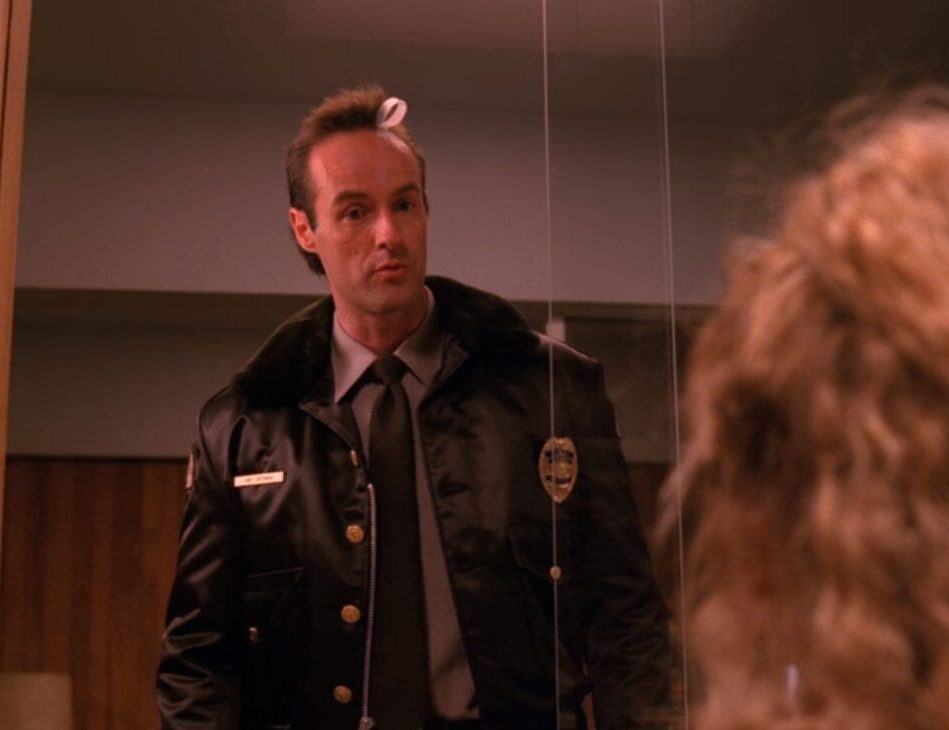
At the Sheriff’s station, Lucy has an encounter with a pesky fly. Andy confronts her about her pregnancy and awkwardly reveals that he’s sterile in the process.
I do find this part of their relationship a little frustrating, but I accept that misunderstanding serves as comic relief, especially for Lucy and Andy. Unfortunately for Andy, the way he reveals that he’s sterile does make him appear a little extra-stupid. Fortunately for the viewer, it’s funny to watch.
“Audrey’s missing”
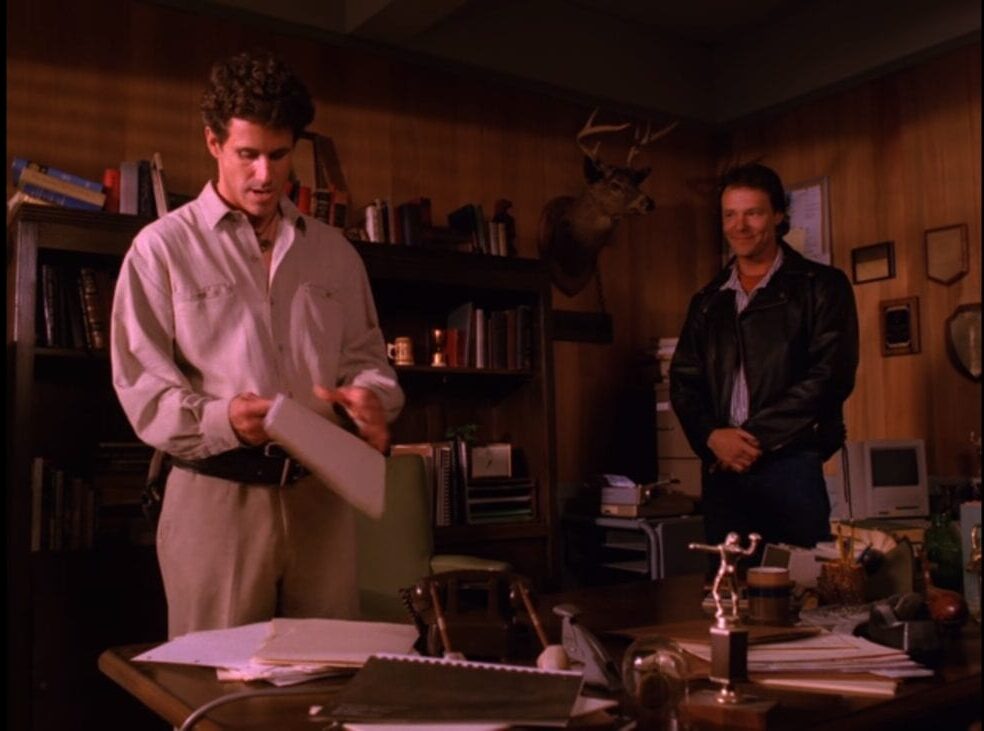
In Harry’s office, Hank mocks Harry’s buck before obnoxiously signing his parole check-in sheet. Dale quickly deduces that Harry and Hank used to be friends. Then Ben Horne calls to casually alert Harry that Audrey has been missing for as long as two days.
The best element of this scene is Dale’s crestfallen face when he learns Audrey is missing. Ben really comes off like a cold-hearted bastard, sipping red wine while nonchalantly revealing that his daughter is missing. It’s hard not to feel bad for Audrey, knowing her father is so disinterested in her whereabouts.
The reveal that Hank used to be “one of the best” Bookhouse Boys is interesting. Harry certainly appears disappointed in Hank’s life choices, but I sense there’s also an undercurrent of guilt. Could something that happened between Harry and Hank in the past have led Hank toward a life of crime? Or maybe they were once just close friends who turned into enemies, causing Harry some bitterness. Either way, I feel like if the series had continued back in the ’90s, that backstory would have eventually been fleshed out.
“I know him!”
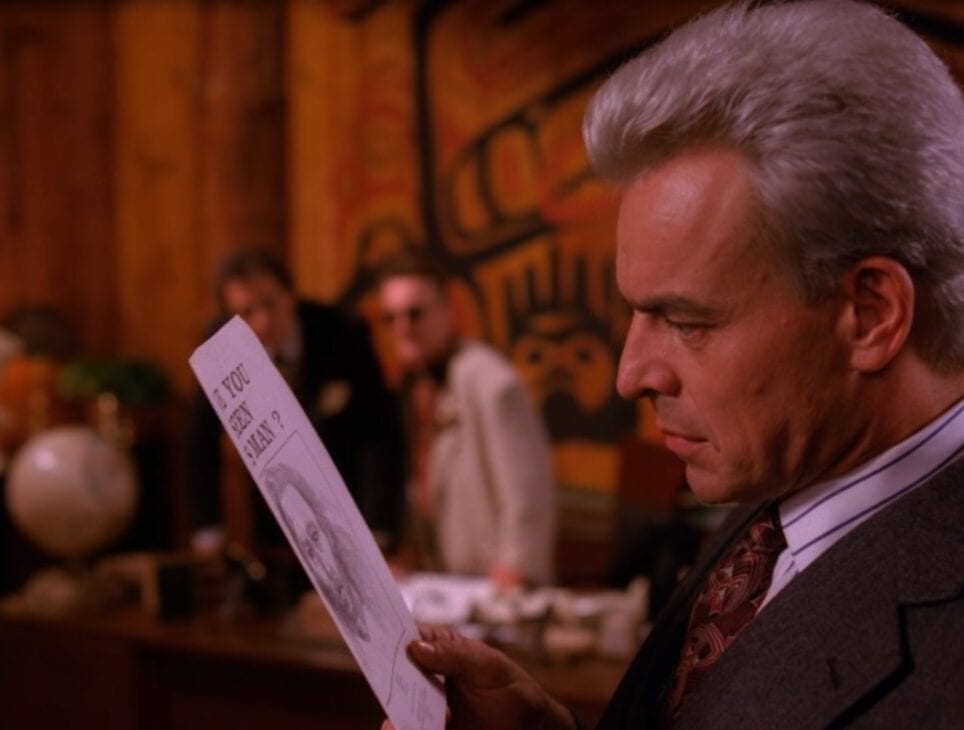
Ben and Jerry learn that Leland told the Icelanders about the Mill fire. Concerned, Ben wants to take Leland off damage control, but Leland gets distracted by the sight of BOB’s wanted flyer.
Is BOB playing with Ben as he pretends to be Leland, or is Leland really just coming unglued in this scene? Leland’s attraction to the flier and his subsequent revelation that he knew BOB from his grandparents’ summer house on the Pearl Lakes reads like a possessed Leland trying to connect the dots within himself. On the other hand, it seems equally plausible that BOB is toying with the Horne brothers but genuinely caught off guard by the flier.
Looking back, it seems so obvious that something is deeply amiss with Leland. I would imagine that most fans watching at the time must have been getting suspicious of him. Jerry’s response, (“Is this real, Ben, or some strange and twisted dream?”) feels like a commentary of what fans watching live might have been feeling.
“Is he a vegetable?”
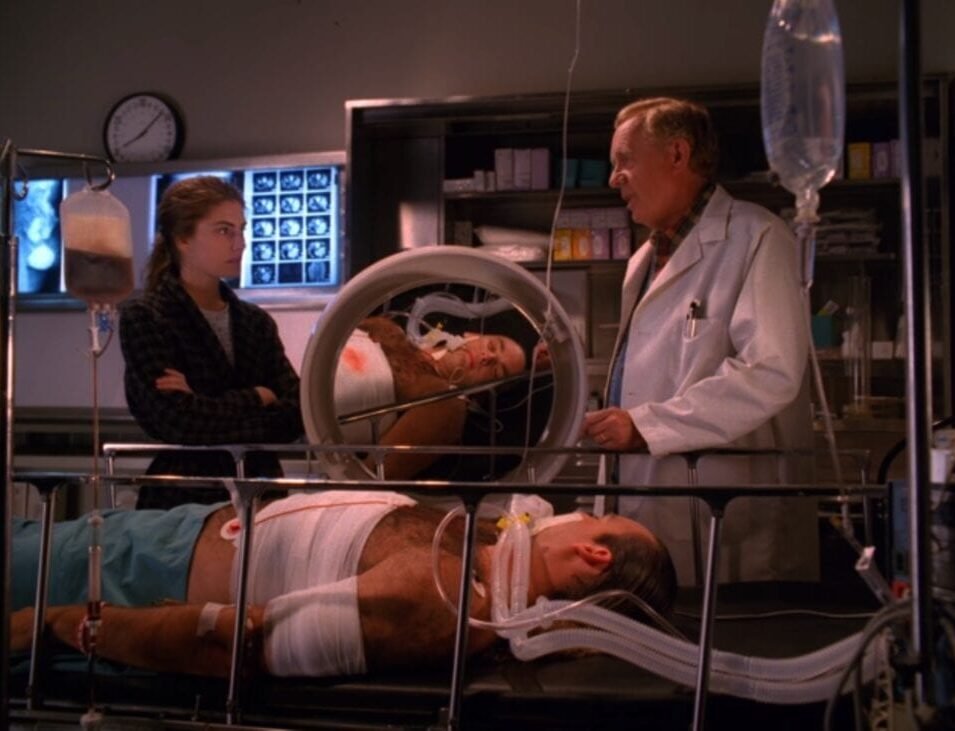
Doc Hayward tells Shelly that Leo is in a coma at the hospital. Upon understanding the full gravity of Leo’s current, vegetable-like state, Shelly starts to cry.
Given her sweet nature, and everything Leo put her through during their marriage, I feel like her tears are just as much related to a sense of relief as they are sadness. I also believe this scene is the only interaction between Shelly and Doc Hayward in the series, so that makes it special. I love how kind Doc Hayward is toward her, fatherly even, which seems to be an ingrained part of his character. Leo’s bedridden presence works as a nice bit of karma, too. I’d say Leo got what he deserved.
“Hello, Twin Peaks Sheriff station”

Lucy receives a strange phone call at the station. The caller wants to be connected to Sheriff Truman, but won’t identify himself.
I assume the caller was likely Leland/BOB. In the previous scene with Ben and Jerry, Leland rushed off to talk to Sheriff Truman about BOB’s wanted flyer. However, I’m not 100% sure, only because I don’t know why he wouldn’t just give his name. The ominous background music adds to the overall creepiness of the call and supports a possible BOB encounter.
“Look at those toes!”

At One-Eyed Jacks, Audrey gets the better of Emory Battis while he’s in a compromising position. She forces him to admit that Ben owns One-Eyed Jacks and that Ben was aware that Laura had worked there.
There are so many strange, dark, and funny components to this scene that I like. Vacuums, carpets, red décor, and bizarre scenarios feel like true Lynchian calling cards, so Emory’s predicament fits in well. What strikes me most about this scene is how intense Audrey is when she says, “I’m Audrey Horne, and I get what I want!”
However, learning your father owns a brothel and plays host to all the girls who work there can’t be an easy thing to digest. I suppose her encounter with Ben as “the new girl” prepared her for this information. Even still, I think Audrey is in way over her head by this point. I wish she would just run away.
“Bobby Briggs, I’m gonna eat you up!”

Bobby and Shelly listen to the blues while they park. Bobby tries to sell her on the idea of milking disability checks off of Leo’s condition, the caveat being that Leo has to come home.
I love Shelly and Bobby, and I hated that they weren’t together in Season 3, but watching this scene made me see that she’s always been attracted to bad boys and bad ideas. Also, Bobby’s belief in a disability windfall shows his own naiveté. Nevertheless, their relationship is always sweet and sexy and fun to watch, even if I cringe a bit at what a bad idea it is.
“Cooper, Cooper, Cooper”

In Dale’s hotel room, Major Briggs brings him a secret message decoded from his deep-space monitor.
This scene felt like something from The X-Files, even though The X-Files came after Twin Peaks and was likely inspired by it as well. Not to mention that David Duchovny stars in that show, while Don Davis, Kenneth Welsh, and Michael Horse all had roles in it. Here, Major Briggs’ messages, “The owls are not what they seem” and “Cooper, Cooper, Cooper,” are solidified in the heart of the show’s mythos.
My take on the owls is that they are, for lack of a better phrase, transportation vehicles/watchers for the spirits of the Black Lodge. Does Major Briggs actually send those messages from the future, as elements from Season 3 and The Secret History of Twin Peaks hinted at? I’m not sure that’s ever conclusively answered, but I like thinking of it that way.
Also, Dale is still unaware that Audrey’s note is under his bed. Waiting for him to notice that must have been painstaking for fans watching during the original run. I also thought it was interesting that Dale spoke to Diane about thinking of Audrey’s smile when in Season 3 it seemed like Cooper and Diane were having a flirtation of their own.
“Just you, and I“
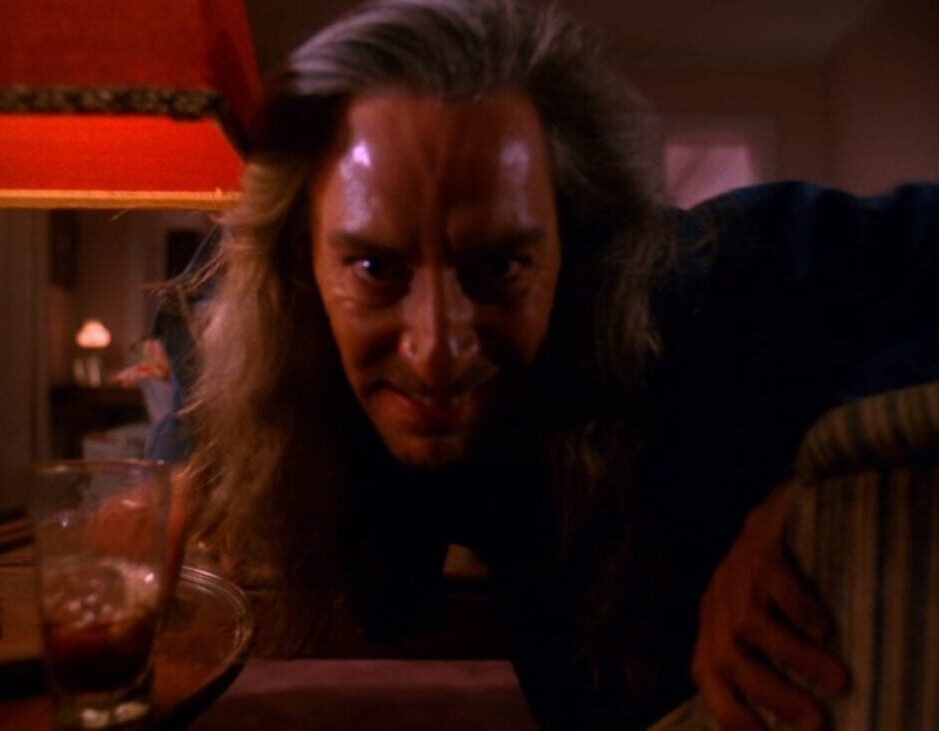
Donna, James, and Maddy sing James’ song “Just You,” in Donna’s living room. However, the sexy glances Maddy and James make toward each other during the song cause Donna to feel insecure. Then Donna receives a mysterious phone call from Harold Smith, while Maddy has a terrifying psychic encounter with BOB.
I believe this is the longest scene in the whole episode, mostly because of the length of the song. It’s also the scariest scene. BOB gets the credit for that aspect because even though it makes me laugh when I see him crawling over the couch after all the times I’ve seen this episode, Maddy’s scream still gives me a chill. I also feel like her presence in Twin Peaks is obviously tempting to BOB and drawing him out. Whether it’s her likeness to Laura or her psychic ability or both, it seems BOB can’t resist taunting Maddy, which, sadly, sealed her fate.
“Just You” has grown on me a lot over the years, in particular when James gets a chance to sing it again in Season 3. I appreciate it as a quirky part of Twin Peaks vernacular, even if I don’t love the song itself. The relationship angst between Donna and James makes me laugh, but I also remember how young love can make people act foolish, so I accept that, too. Their short, troubled romance is part of Twin Peaks’ history, so there is always room in my heart for Donna and James.
“This is no time for schoolgirl games!”

The Giant waves his hand over a sleeping Dale and induces a dream that offers clues about BOB. Then Dale’s awakened by a teary Audrey calling from One-Eyed Jacks, but their call gets cut off quickly by Blackie and Emory Battis.
“Trouble, Miss Horne…” Blackie’s southern twang ends this terrific episode leaving Audrey in a very precarious situation. Thankfully, she offers a clue to her whereabouts by telling Dale she saw him in his tuxedo. I get a kick out of Dale scolding Audrey by saying, “This is no time for schoolgirl games!” He’s right, of course, because she never should have gone to One-Eyed Jacks in the first place.
Blackie and Emory’s ill-conceived plans for Audrey are clearly a bad bet on their part. This twist, like a lot of the original series, feels very on par with a soap opera format. I’ve always been a fan of the soap genre, and that was the trend of television in the ’90s, so I really enjoy this episode’s Lynchian take on that platform.
As for Dale’s dream, the Giant, or as we now know him, the Fireman, seems to be feeding Dale information as he sleeps. Dale dreams of Major Briggs saying, “the owls are not what they seem,” as an owl’s image is transposed over BOB’s face. To me, that feels like the owls are indeed vessels for the spirits of The Black Lodge—one and the same, in a sense.
Final Thoughts

Overall, this episode is full of mystery, character development, and quirky humor—and also a lot of BOB. As the series edges closer toward revealing Laura’s killer, BOB’s influence in Twin Peaks grows paramount. With his electrified grin, BOB is the definition of terror in Twin Peaks. He represents the darkness and evil that lurks on the perimeter of the town’s otherwise innocent and charming visage. By the end of this episode, Dale is closer than he realizes to not only finding the killer but also to his own demise. I’ve always felt that BOB wants Dale’s soul trapped in The Black Lodge as part of his collection. It seemed like he seeks individuals with psychic abilities, or as the One-Armed Man says, “the gifted and the damned.”
Maybe it’s just a means of eliminating those who can see his true face, or maybe it’s because he can use those individuals to carry out his sinister plans, or both. No matter, the more screen time spent with BOB makes for a much creepier and more mysterious episode. With every rewatch, despite some of its plot pitfalls, it can’t be denied that some of the strongest episodes of the series are in Season 2. Personally, the first handful of episodes in the second season are my favorites. Episode 9 carries the darker tone of the Season 2 premiere. It also sets up many of the plotlines that carry on throughout the season, making it one of the strongest in the series.

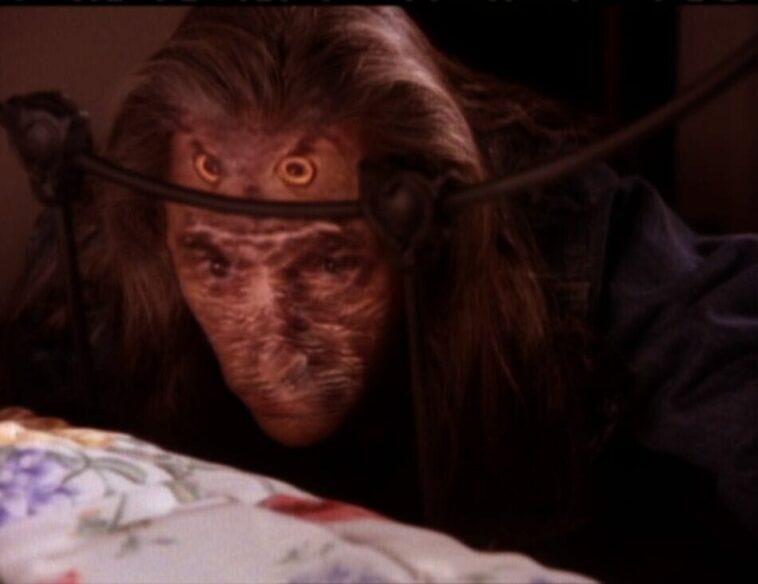
Great article! I completely agree that the first half of Season 2 is extremely underrated